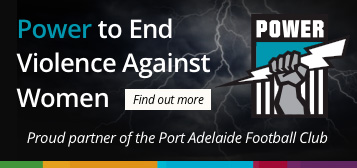Messages about respectful relationships are sticking with male secondary school students beyond the classroom, new research shows.
Flinders University evaluated primary prevention program the Power To End Violence Against Women (PTEVAW) and found it is not only starting but also sustaining conversations that challenge gender-based violence.
The program targets Year 10 students in metropolitan and regional schools, and teaches them how to recognise and stand up to disrespect of women in their lives.
Launched today, the report highlights ways the program is inspiring secondary students across South Australia to become positive bystanders, and the influence Port Adelaide Football Club players have on how they think and behave.
Asked a year after undertaking the program how it had influenced them personally, students stated key messages were taken seriously and were being put into practice each day.
For example, challenging low level behaviours by calling out sexist banter, and learning how and when to step in when they witness inappropriate behaviour.
One boy said he was unaware of what domestic violence was until he had participated in the program, the report states.
“What is quite powerful is the way the program challenges students to look at certain behaviours, such as street harassment or belittling and gendered language, and how this manifests in a mentality that contributes to a normalised continuum of disrespect and inequity,’’ said Research Fellow Dr Jonathon Louth.
“While we are not in a position to measure the extent to which the retention of key messages transitions into behaviour change over the long-term, the study reveals that there is an increase in awareness and there are early indicators of positive outcomes.
“As it stands, the program is vital for starting conversations and speaking across generations.’’
Delivered by Power Community Ltd facilitators, retired Port Adelaide great Russell Ebert and current players, the PTEVAW program’s focus is on healthy and unhealthy relationships, and developing skills to safely challenge harmful attitudes.
Research focus group participants made it clear that their engagement and retention of key messages was built on the involvement of role models. Meeting players and senior coaching staff at follow-up events, including leadership days, was equally important, they said.
Ebert captured the impact in the report stating: “Each time you see that face, each time you hear about the Port Adelaide Football Club you will resonate with the messages that were given on the day.’’
Dr Louth said the report showed how the use of sport and elite players can `cut through’ unhealthy biases and complicit silence: “As a social glue, football clubs and communities are only just starting to reimagine their contribution to the reproduction of values and attitudes that permit behaviours or encourage silence in the face of actual or inferred violence against women.’’
More than 4600 students have engaged with PTEVAW since it began in 2016. The program is delivered over two weeks, with two by two-hour sessions, and is run in partnership with Centacare Catholic Family Services and the State Government.
“For cultural change to occur, we need to raise an awareness of what people don’t know they don’t know,’’ said Pauline Connelly, Deputy Director, Centacare.
“This program has achieved that with the Year 10 students, and with awareness comes choices.’’
Report recommendations include:
- Extend the program beyond the Year 10 cohort to create a whole-of-school approach
- Involve girls but in such a way that rejects them taking responsibility for the actions of men or boys who perpetrate negative behaviours
- Commit to longitudinal evaluation to track the impact of the program within each unique setting
- Develop student leaders and allies to assist with delivering the program to their peers
For more information, please phone Elizabeth Rowe 8215 6761 or 0437 062 302.























